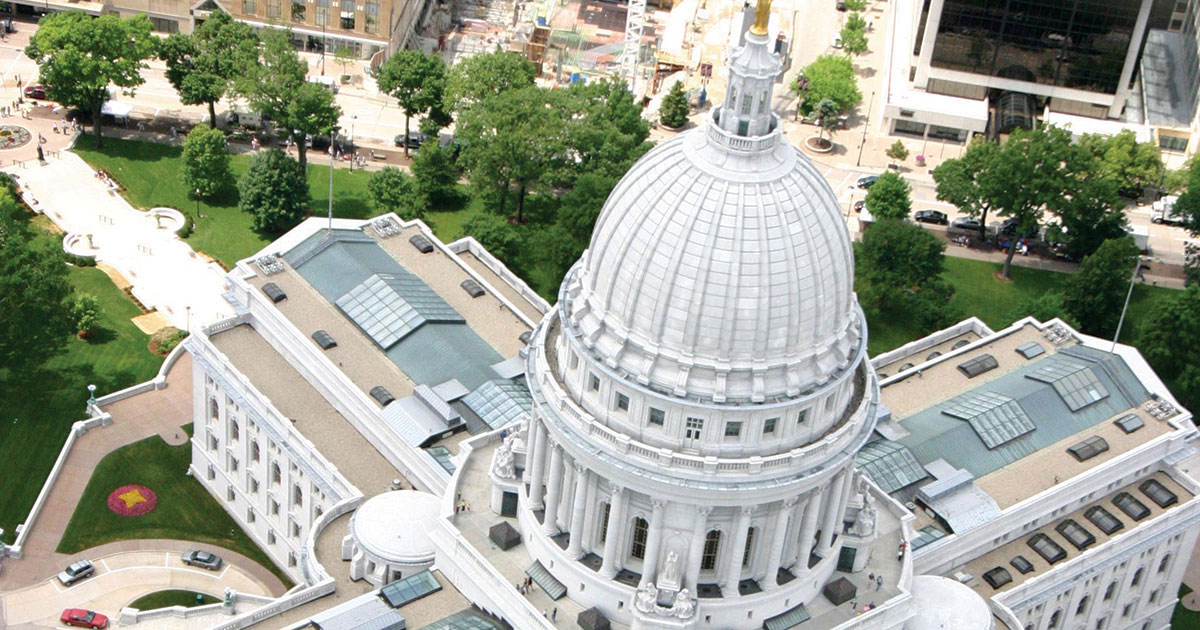
There are two constants in Wisconsin politics: elections and the state’s biennial budget process. Neither occurs daily and both have specific timelines for certain actions, but they are essentially continuous and intertwined and often seem like they never really end. As soon as one gets finished, the focus turns to the next one, then the next, and so on.
Wisconsin’s nonpartisan Legislative Fiscal Bureau (LFB) is considered one of the top fiscal analyst agencies in the country. Leading the LFB since 1977 and a member on staff since 1971, Bob Lang is the authoritative fiscal expert for anything and everything involving the state budget. The staff at the LFB assist with everything from a minor expenditure of a few thousand dollars to major spending programs that can run into the billions. Each legislative session, the LFB publishes several informational papers on state financial issues including taxes, education spending, justice issues, and more.
One of the LFB papers released each legislative session is referred to as “The State Budget Process” or informational paper 80. The paper states that it is designed to provide a layperson’s introduction to the budget process. The paper provides a wealth of knowledge and has tables and graphs with historical data. It is a must read for anyone wanting to know more about the budget process, and this basic, layperson’s introduction is only 70 pages long.
The informational paper is also nonpartisan. The LFB provides the numbers, background, and research and lays out all the alternatives for the 16 members of the legislature’s Joint Committee on Finance to consider when voting on individual budget provisions. The numbers are just one piece of a difficult budget puzzle that will spend over $100 billion in the two fiscal years it covers. No other legislative issue will receive more communication and be lobbied on more than the biennial budget.
Funding Issues of Interest to the State Bar’s Board of Governors
The State Bar’s Board of Governors advocates on several items of interest for state funding. Market-driven pay increases for assistant district attorneys and public defenders and rate increases for private bar attorneys appointed to public defense cases are always priority issues. Funding increases for the court system, judges, and other justice system issues that might be funded or underfunded are another. Funding of the criminal justice system will always remain an issue of great importance, and the State Bar will be advocating for those funding challenges going forward.
 Cale Battles, is the Government Relations Program manager with the State Bar of Wisconsin. He can be reached by email, or by phone at (608) 250-6077.
Cale Battles, is the Government Relations Program manager with the State Bar of Wisconsin. He can be reached by email, or by phone at (608) 250-6077.
 Lynne Davis, is a government relations coordinator with the State Bar of Wisconsin. She can be reached by email, or by phone at (608) 250-6045.
Lynne Davis, is a government relations coordinator with the State Bar of Wisconsin. She can be reached by email, or by phone at (608) 250-6045.
 Devin Martin is grassroots outreach coordinator with the State Bar of Wisconsin.
Devin Martin is grassroots outreach coordinator with the State Bar of Wisconsin.
For the 2025-27 biennial budget, the State Bar’s Board of Governors has increased efforts to highlight an additional area in need of state funding: civil legal aid. In his budget released in February, Governor Tony Evers proposed allocating $43 million in state funding for civil legal aid and an additional $9 million to be allocated from the federally funded Temporary Assistance for Needy Families (TANF) program. Since 2015, the Wisconsin Legislature has approved $500,000 every year for civil legal aid assistance from the TANF allocation. Currently this money is limited to domestic violence and sexual abuse services, as well as restraining orders in limited cases. Outside of the $1 million appropriation of federal dollars, there is no state funding going to services for low-income individuals for civil legal services.
The State Bar, along with other legal service providers and stakeholders, are working to educate elected officials on the issue. The budget request is centered around funding specific areas of need such as legal issues for older adults, increasing and expanding assistance for domestic violence victims, assistance for self-help legal kiosks and websites, and more.
Providing funding for civil legal needs brings additional benefits beyond assisting individuals. It provides tangible economic benefits to communities by helping recipients secure housing and employment, leading to higher tax revenue and greater self-sufficiency. Civil legal aid helps protect people from potential abuse, resulting in fewer emergency room visits, shelter stays, and police calls. Increased civil legal aid funding would also benefit the justice system and taxpayers by relieving strain on the court system and on judges, who often struggle to find the best way to deal with unrepresented parties.
Whether it is a criminal case or a civil matter, the reality is that the legal system works best when both sides are represented by attorneys. It helps courts and the overall legal system function more efficiently, and it provides a more cost-effective solution for taxpayers. To raise awareness of these benefits, State Bar members should communicate to elected officials on just how important civil legal aid is to our communities.
Contacting Legislators is Easy with the State Bar Advocacy Center
The State Bar’s Advocacy Center (wisbar.org/GovRelations) makes contacting your legislators as easy as possible. With readily accessible information and only a minute or two, members can submit comments on any of the State Bar’s current advocacy campaigns or compose their own message to elected officials.
Taking a few extra minutes to personalize a message to share stories and individual experiences is an even more effective way to get your message across. Maybe you provide pro bono service or assist with a law school clinic. Maybe you just agree that the best justice system is one that is fair and equal and provides justice for all. Whatever your personal experience, share it with your state legislators. An increase in state funding on civil legal needs depends on an overwhelming number of State Bar members reaching out and sharing their voice.
Sign Up
Stay engaged to help move legislation forward. Learn about the State Bar’s Government Relations program, access the Advocacy Network Grassroots Toolkit, and read the monthly e-newsletter, Rotunda Report.
State Bar Advocacy Network wisbar.org/GovRelations
Rotunda Report wisbar.org/rotundareport
» Cite this article: 98 Wis. Law. 41-42 (April 2025).
